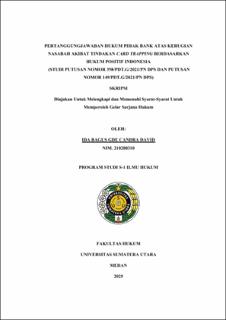| dc.contributor.advisor | Barus, Utary Maharany | |
| dc.contributor.advisor | Mulhadi | |
| dc.contributor.author | David, Ida Bagus Gde Candra | |
| dc.date.accessioned | 2025-04-16T04:14:10Z | |
| dc.date.available | 2025-04-16T04:14:10Z | |
| dc.date.issued | 2025 | |
| dc.identifier.uri | https://repositori.usu.ac.id/handle/123456789/103143 | |
| dc.description.abstract | Acting as a financial intermediary institution obliges banks to conduct their business activities with full responsibility, including adhering to the prudential principle. Banks are required to ensure security and convenience in transactions for their customers and bear responsibility if any obstacles or issues arise that may harm customers, including card trapping crimes experienced by ATM users, as seen in Decision No. 358/Pdt.G/2021/PN Dps and Decision No. 149/Pdt.G/2021/PN Dps. Therefore, this thesis examines the legal regulations concerning card trapping that harms customers, the efforts to recover customer funds due to card trapping, as well as the bank’s legal liability and the judges' legal considerations regarding such incidents.
This research adopts a normative legal research method using a statutory approach and examines as well as analyzes legal provisions in related cases and other legal literature relevant to the research objectives. The data collection technique employed is library research.
The findings of this study indicate that the bank’s negligence in disregarding customer rights constitutes an unlawful act, allowing customers to hold the bank accountable for their losses. However, legal liability is also determined based on legal facts and the burden of proof established by the panel of judges. The regulation regarding card trapping remains unclear, as it still relies on several regulations related to Payment Instrument Using Cards (APMK). Therefore, legal reform is necessary to address banking challenges in the digital era. Banks are obliged to take responsibility for negligence or errors and must ensure the security of customer data and information. As a Financial Services Institution (PUJK), banks do not operate independently but are supervised by the Financial Services Authority (OJK), which facilitates customer complaints regarding banking losses and provides legal remedies for customers seeking compensation for their losses. | en_US |
| dc.language.iso | id | en_US |
| dc.publisher | Universitas Sumatera Utara | en_US |
| dc.subject | Legal Responsibility | en_US |
| dc.subject | Consumer Protection | en_US |
| dc.subject | Card Trapping | en_US |
| dc.subject | Bank | en_US |
| dc.subject | ATM | en_US |
| dc.title | Pertanggungjawaban Hukum Pihak Bank Atas Kerugian Nasabah Akibat Tindakan Card Trapping Berdasarkan Hukum Positif Indonesia (Studi Putusan Nomor 358/Pdt.G/2021/PN Dps dan Putusan Nomor 149/Pdt.G/2021/PN Dps) | en_US |
| dc.title.alternative | The Legal Responsibility of Banks for Customer Losses Arising from Card Trapping Practices Under Indonesian Positive Law: A Case Study of Court Decisions No. 358/Pdt.G/2021/PN Dps and No. 149/Pdt.G/2021/PN Dps | en_US |
| dc.type | Thesis | en_US |
| dc.identifier.nim | NIM210200310 | |
| dc.identifier.nidn | NIDN0014017501 | |
| dc.identifier.nidn | NIDN0004087303 | |
| dc.identifier.kodeprodi | KODEPRODI74201#IlmuHukum | |
| dc.description.pages | 157 Pages | en_US |
| dc.description.type | Skripsi Sarjana | en_US |
| dc.subject.sdgs | SDGs 16. Peace, Justice And Strong Institutions | en_US |


